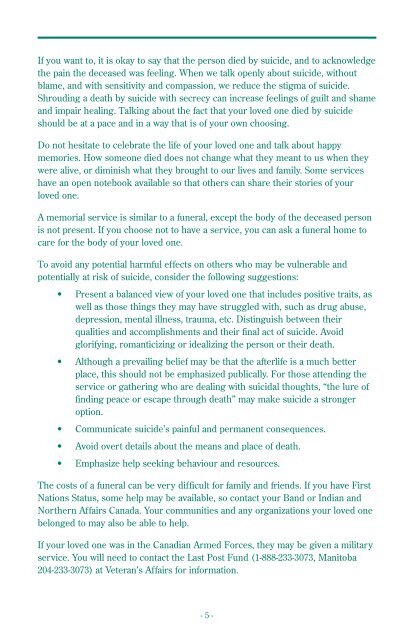After a Suicide - Practical Personal Guide for Survivors
After a Suicide - Practical Personal Guide for Survivors
After a Suicide - Practical Personal Guide for Survivors
You also want an ePaper? Increase the reach of your titles
YUMPU automatically turns print PDFs into web optimized ePapers that Google loves.
If you want to, it is okay to say that the person died by suicide, and to acknowledge<br />
the pain the deceased was feeling. When we talk openly about suicide, without<br />
blame, and with sensitivity and compassion, we reduce the stigma of suicide.<br />
Shrouding a death by suicide with secrecy can increase feelings of guilt and shame<br />
and impair healing. Talking about the fact that your loved one died by suicide<br />
should be at a pace and in a way that is of your own choosing.<br />
Do not hesitate to celebrate the life of your loved one and talk about happy<br />
memories. How someone died does not change what they meant to us when they<br />
were alive, or diminish what they brought to our lives and family. Some services<br />
have an open notebook available so that others can share their stories of your<br />
loved one.<br />
A memorial service is similar to a funeral, except the body of the deceased person<br />
is not present. If you choose not to have a service, you can ask a funeral home to<br />
care <strong>for</strong> the body of your loved one.<br />
To avoid any potential harmful effects on others who may be vulnerable and<br />
potentially at risk of suicide, consider the following suggestions:<br />
• Present a balanced view of your loved one that includes positive traits, as<br />
well as those things they may have struggled with, such as drug abuse,<br />
depression, mental illness, trauma, etc. Distinguish between their<br />
qualities and accomplishments and their final act of suicide. Avoid<br />
glorifying, romanticizing or idealizing the person or their death.<br />
• Although a prevailing belief may be that the afterlife is a much better<br />
place, this should not be emphasized publically. For those attending the<br />
service or gathering who are dealing with suicidal thoughts, “the lure of<br />
finding peace or escape through death” may make suicide a stronger<br />
option.<br />
• Communicate suicide’s painful and permanent consequences.<br />
• Avoid overt details about the means and place of death.<br />
• Emphasize help seeking behaviour and resources.<br />
The costs of a funeral can be very difficult <strong>for</strong> family and friends. If you have First<br />
Nations Status, some help may be available, so contact your Band or Indian and<br />
Northern Affairs Canada. Your communities and any organizations your loved one<br />
belonged to may also be able to help.<br />
If your loved one was in the Canadian Armed Forces, they may be given a military<br />
service. You will need to contact the Last Post Fund (1-888-233-3073, Manitoba<br />
204-233-3073) at Veteran’s Affairs <strong>for</strong> in<strong>for</strong>mation.<br />
- 5 -



